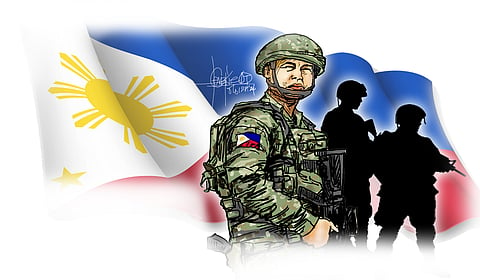
- NEWS
- the EDIT
- COMMENTARY
- BUSINESS
- LIFE
- SHOW
- ACTION
- GLOBAL GOALS
- SNAPS
- DYARYO TIRADA
- MORE

Among the biggest achievements of the current administration, which will resound through generations of Filipinos, is the strengthening of the military in terms of assets that are equal to the courage of the troops.
Filipino soldiers are respected for their bravery and resilience and this has been proven in many instances.
In the global battle against terrorism, Filipinos have proven their worth. The breaking of the Marawi siege of the feared Islamic State (IS) in 2017 is now part of the military manuals of other nations on the conduct of urban anti-terrorism warfare.
What took the United States years to resolve in the Middle East, Filipino soldiers achieved in six months, which was the liberation of a city the IS wanted to turn into the center of operations of a Southeast Asian caliphate.
Much earlier, in 2014, Filipino forces serving as United Nations blue helmets distinguished themselves in the Syrian terror siege of the Golan Heights in Israel.
This show of heroism marked its 10th year last 28 August and a circle of those who participated in the heroic stand recalled the incident with outpouring pride.
It started with 45 Fijian UN peacekeepers being seized by the al-Qaeda-linked group Nusra Front in Syria after the well-armed terror group crossed the ceasefire line in the Golan Heights on Israel’s border.
The UN contingent from the Philippines telephoned Manila to report an attempt to seize them, advising that they were surrounded. Should they surrender and risk being held by the terrorists or hold their ground?
UN force commander, General Iqbal Singh Singha of India, fearing Fijian lives could be in jeopardy if the Filipinos engaged in a firefight, ordered them to hold their fire implying that they surrender, but Armed Forces of the Philippines Chief of Staff Gregorio Catapang gave a different order which was for the men to stand their ground.
“Don’t surrender” was the general’s command.
The Syrian terrorists then learned a lesson about grit and determination from the Filipinos.
For three days, the Filipino troops fended off hundreds of terrorists, killing at least three on the final day before escaping under cover of darkness to Israel. The Fijians were released after two weeks of negotiations.
The stand of the Filipino contingent caused a controversy as Iqbal accused them of insubordination. Philippine military officials, nonetheless, maintained that the peacekeeping contingent retained allegiance to their commanders back home.
The dramatic face-off between the Filipino UN forces and the terrorists was the most violent incident in the Golan Heights since the Syrian conflict erupted in March 2011.
The 1,223-strong six-nation UN force, known as the UN Disengagement Observer Force at the time had been at the Golan Heights since 1974.
The UNDOF’s job was to monitor the ceasefire line between Syria and Israel — the so-called disengagement zone that barred both Israeli and Syrian troops.
The two countries have officially been at war since the end of the 1973 Arab-Israeli conflict but their border has been largely quiet.
Before the Syrian war broke out, blue-helmeted UN observers stationed in the mountainous region had a relatively easy job. For years their main enemy was boredom.
Syrian rebels then kidnapped 21 Filipino peacekeepers in March 2013 and while all were released unharmed, the hostage-taking was exploited by the terror group to gain concessions from the UN and Israel. Two months later the terrorists kidnapped and released a handful of other peacekeepers of different nations.
With the legacy of heroes in their blood, Filipino soldiers are now showing their extreme bravery in the maritime friction with China where they are fending off threats to the country’s territory through unarmed resistance.
“No surrender” are the words that echo whenever Filipinos are around.
